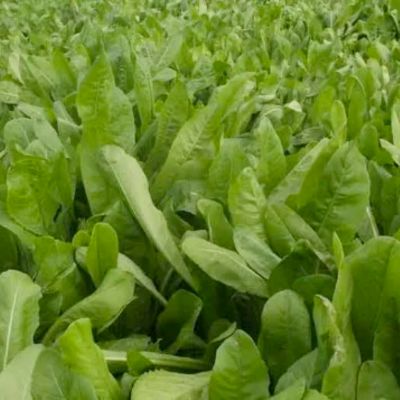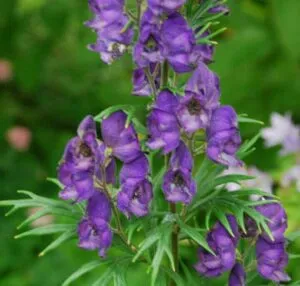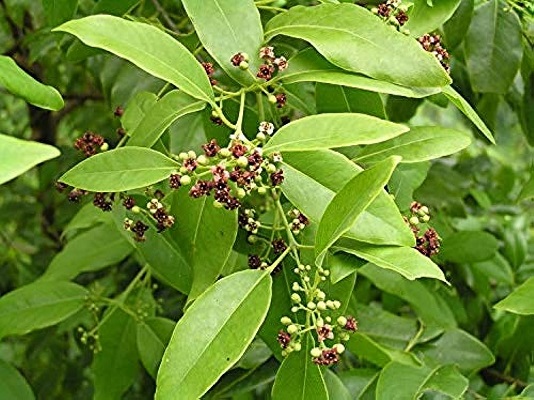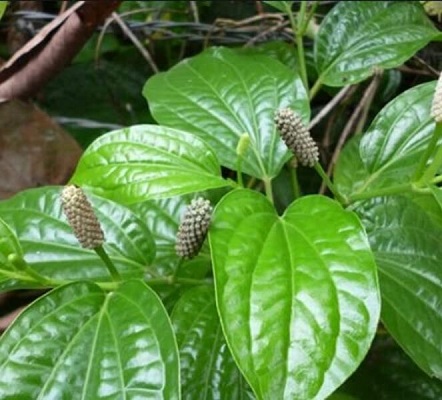On This Page
Vatsanabha – Aconitum ferox
Introduction
Vatsanabha, commonly known as Monk’s hood or Indian aconite is one of most commonly used herb for the alleviation of pain and allergic conditions. Vatsanabha pocess poisonous properties but it is used as a medicine in Ayurveda after purification. It is purified either by immersing in cow’s urine for 3 days or by immersing and boiling in milk for 3-6 hours.
Dr. Gupta’s IAFA have been studying on readily available herbs for the purpose of alleviating allergic condition. Our experts studied on Vatsanabha and proven the plant’s therapeutic activities like Antiallergic, Febrifuge, Antidiarrheal, Spasmogenic, Psychostimulant, Cardiac stimulant, Analgesic, Diaphoretic, Anodyne, Irritant, Sedative actions etc. Thin layer chromatography studies have shown that toxic substances like pseudoaconitine and aconitine in Vatsanabha were converted into far tess toxic substances like vertroylpseudoaconite and bezoylaconite respectively after purification which aids its use in medicine. In low doses Vatsanabha is proven to process actions like antipyretic, analgesic, antirheumatic, appetizer and digestive. Nowadays it is also used in allergic conditions.
Action of Vatsanabha – Aconitum ferox in Allergies
IAFA experts have successfully proven the antiallergic property of the plant Vatsanabha. The plant contains phytoconstituents like indaconitine, chasmaconitine, chasmanine, lycoctonine, aconitine, delphinine, bikhacontine, pseudaconitine etc. These phytoconstituents aids the antiallergic and analgesic property of Vatsanabha. It can also be effectively used in allergic conditions.
Vernacular Names
| Hindi name | Adosa, Arusha, Rus, Bansa, Adusa |
| Sanskrit name | Vasa, Vasaka, Vasika, Vasayati Acchadayati, Simhi, Simhasya, Medanta, Vrisha, Vrusha, Varshati, Madhu, Atarusha, Atarooshaka, Bhishagatma |
| English name | Malabar Nut |
| Tamil name | Eadadad, Adathodai |
| Bengali name | Adulsa, Bakash, Vasok Punjabi Name-Vamsa, Bhekkar |
| Marathi name | Adulsa, Adusa |
| Telgu name | Addasaramu, Adam Kabu, Adampaka |
| Gujrati name | Adusol, Aradusī, Also, Aduraspee, Bansa |
| Kannada name | Adusogae, Adu muttada soppu |
| Malayalam name | Adolakam |
Botanical Name
Aconitum ferox
Family
Rananculaceae
Morphology of Varuna – Crataeva Nurvala
- Small tree
- Stems are erect, woody
- Stem bark is greyish
- Leaves are compound type, lanceolate
- Inflorescence is terminal corymb
- Fruits are berry
- Seeds are many and woody
Ayurveda Reference of Vatsanabha – Aconitum ferox

Geographical Distribution of Vatsanabha – Aconitum ferox
Vatsanabha is found in alpine and subalpine western Himalayan regions.
Phytoconstituents of Vatsanabha – Aconitum ferox
The plant contains phytoconstituents like indaconitine, chasmaconitine, chasmanine, lycoctonine, aconitine, delphinine, bikhacontine, pseudaconitine etc.
Parts Used of Vatsanabha – Aconitum ferox
- Root
Dosage of Vatsanabha – Aconitum ferox
- Powder (churna) – 62.5 – 125 mg
Medicinal Properties of Vatsanabha – Aconitum ferox
- Kasahara – relieves cough
- Vedanahara-relieves pain
- Sophahara – relieves swelling
- Swasahara – relieves asthma
- Rasayana – rejuvenative
- Jwaraghna – useful in fever
- Pacana – digestant
- Dipana – carminative

Have A Health Issue?
Consult Online
- Dr. Sahil Gupta (B.A.M.S., M.H.A.)
Ayurvedic Allergy Specialist
CEO & Founder of IAFA®
Home Remedies of Vatsanabha – Aconitum ferox
Ayurveda is an ancient Indian system of medicine which uses commonly seen herbs to treat various diseases. Vatsanabha is one of the commonly as en herb and has different uses like,
- As Rejuvenative (Rasayana) – Vatsanabha is regarded as one of the rasayana drugs and is an important ingredient in various rasayanas.
- In Chronic fever (Jirnajwara) – Powder of Vatsanabha, Symplocusracemosa, Santalum album, Acoruscalamus is taken with sugar, ghee, honey and milk.
- In Swelling (Sotha) – Powder of Vatsanabha is made into a paste and applied.
- In Fever (Jwara) – Powder of Vatsanabha is taken along with honey and ghee.
- As Digestant (Pacana) – The purified root of Vatsanabha is powdered and taken after food.
- As a Carminative (Deepana) – Vatsanabha powdered and taken before food. It can act as a carminative.
- In Pain (Sula) – Powdered Vatsanabha along with honey and ghee is administered.
- In Cough (Kasa) – Vatsanabha powdered and taken with honey.
Dr. Gupta’s IAFA has been conducting research programmes to identity the phytoconstituents and actions of various drugs used in Ayurveda. Our system mainly aims in the growth of Ayurveda science and maintains a strict protocol to ensure the safety of all consumers. The well experienced members of IAFA are consistently working to find out the most effective ways to cure all diseases especially Allergic disorders. All the herbs used in our system are mentioned in the basic texts of Ayurveda and are collected naturally.
Reach IAFA for safe herbal remedies for all your ailments!!!
Was this Page Helpful?
Read More Articles
-

Kasini (Cichorium intybus)
Kasini (Cichorium intybus) commonly known as Chicory is a perennial herb, with large…
-
-









